Auditing: Evaluation of Ethical Responsibilities of Management and Auditors in One Tel Case Study
VerifiedAdded on 2023/06/14
|13
|2933
|130
AI Summary
This report evaluates the ethical responsibilities of the management of One Tel and its auditors, Ernst & Young, in the corporate collapse of One Tel. It sheds light on the malpractices of the management and the violation of auditing standards by Ernst & Young.
Contribute Materials
Your contribution can guide someone’s learning journey. Share your
documents today.
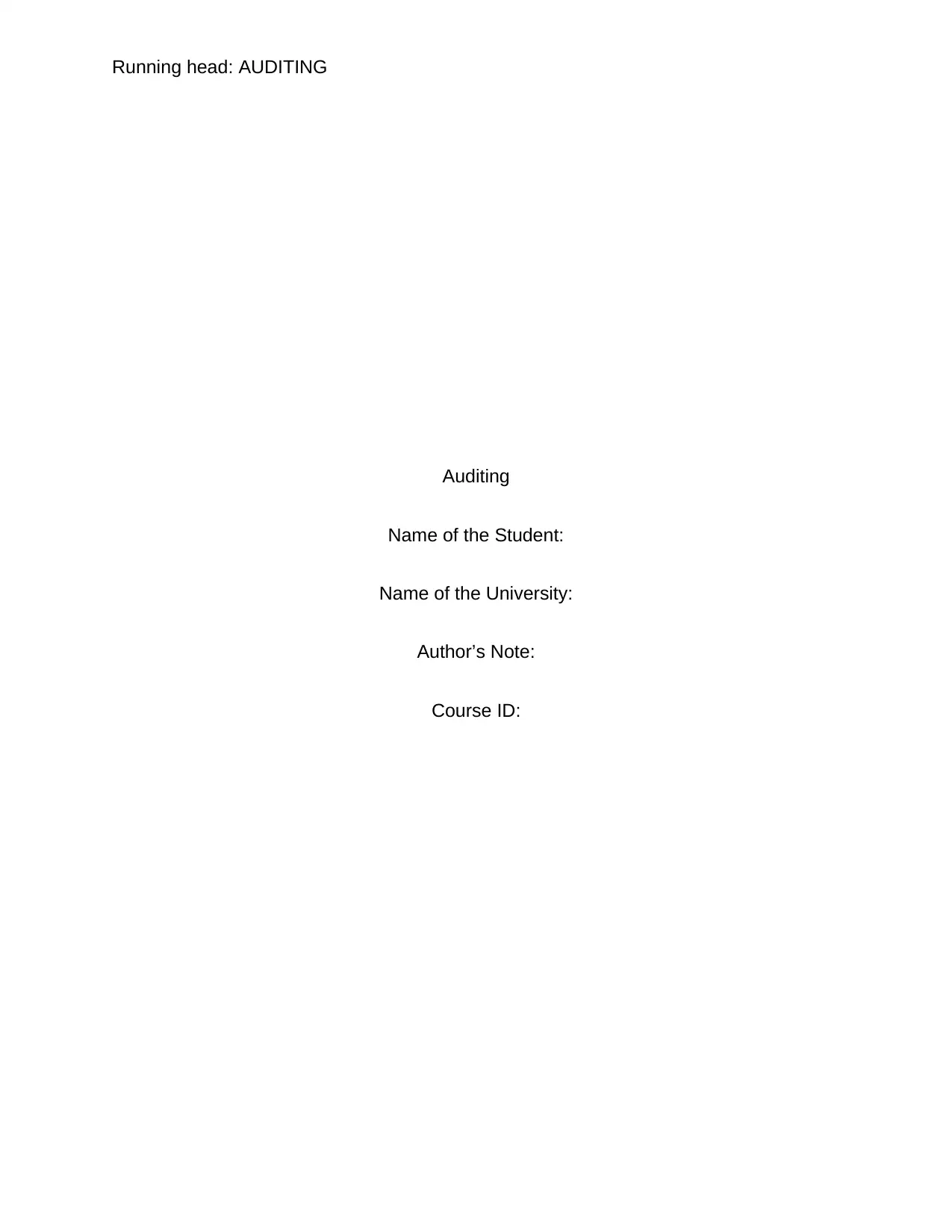
Running head: AUDITING
Auditing
Name of the Student:
Name of the University:
Author’s Note:
Course ID:
Auditing
Name of the Student:
Name of the University:
Author’s Note:
Course ID:
Secure Best Marks with AI Grader
Need help grading? Try our AI Grader for instant feedback on your assignments.
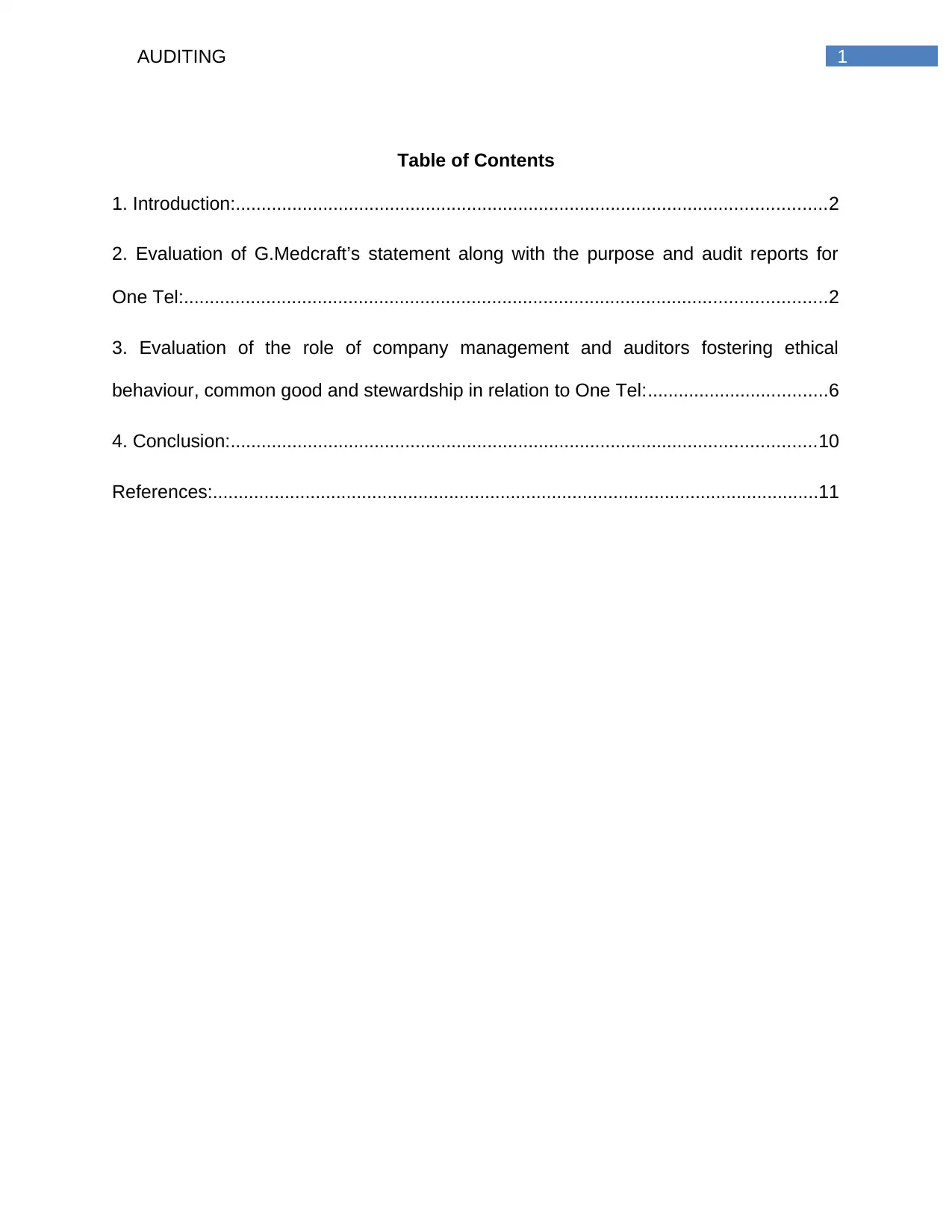
1AUDITING
Table of Contents
1. Introduction:...................................................................................................................2
2. Evaluation of G.Medcraft’s statement along with the purpose and audit reports for
One Tel:.............................................................................................................................2
3. Evaluation of the role of company management and auditors fostering ethical
behaviour, common good and stewardship in relation to One Tel:...................................6
4. Conclusion:..................................................................................................................10
References:......................................................................................................................11
Table of Contents
1. Introduction:...................................................................................................................2
2. Evaluation of G.Medcraft’s statement along with the purpose and audit reports for
One Tel:.............................................................................................................................2
3. Evaluation of the role of company management and auditors fostering ethical
behaviour, common good and stewardship in relation to One Tel:...................................6
4. Conclusion:..................................................................................................................10
References:......................................................................................................................11
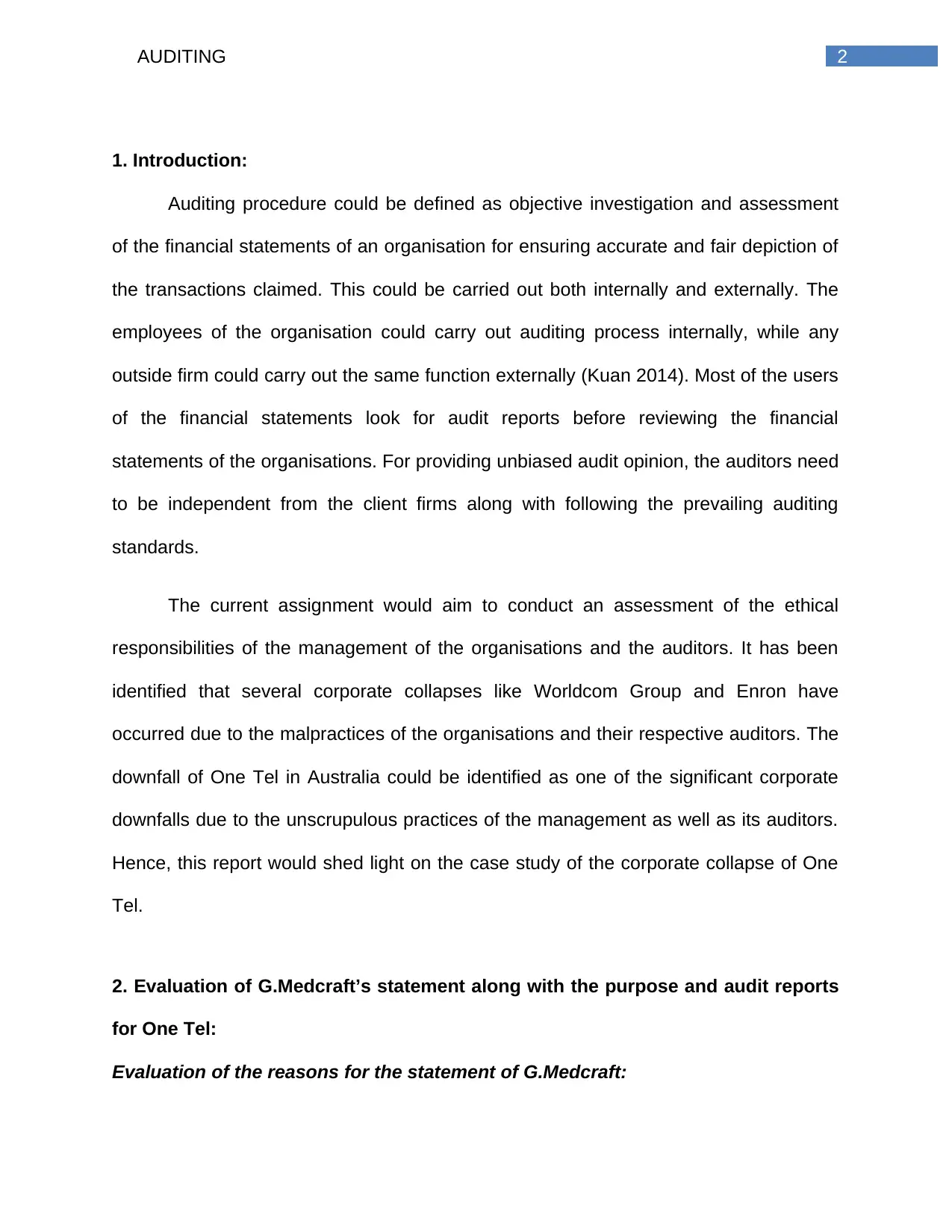
2AUDITING
1. Introduction:
Auditing procedure could be defined as objective investigation and assessment
of the financial statements of an organisation for ensuring accurate and fair depiction of
the transactions claimed. This could be carried out both internally and externally. The
employees of the organisation could carry out auditing process internally, while any
outside firm could carry out the same function externally (Kuan 2014). Most of the users
of the financial statements look for audit reports before reviewing the financial
statements of the organisations. For providing unbiased audit opinion, the auditors need
to be independent from the client firms along with following the prevailing auditing
standards.
The current assignment would aim to conduct an assessment of the ethical
responsibilities of the management of the organisations and the auditors. It has been
identified that several corporate collapses like Worldcom Group and Enron have
occurred due to the malpractices of the organisations and their respective auditors. The
downfall of One Tel in Australia could be identified as one of the significant corporate
downfalls due to the unscrupulous practices of the management as well as its auditors.
Hence, this report would shed light on the case study of the corporate collapse of One
Tel.
2. Evaluation of G.Medcraft’s statement along with the purpose and audit reports
for One Tel:
Evaluation of the reasons for the statement of G.Medcraft:
1. Introduction:
Auditing procedure could be defined as objective investigation and assessment
of the financial statements of an organisation for ensuring accurate and fair depiction of
the transactions claimed. This could be carried out both internally and externally. The
employees of the organisation could carry out auditing process internally, while any
outside firm could carry out the same function externally (Kuan 2014). Most of the users
of the financial statements look for audit reports before reviewing the financial
statements of the organisations. For providing unbiased audit opinion, the auditors need
to be independent from the client firms along with following the prevailing auditing
standards.
The current assignment would aim to conduct an assessment of the ethical
responsibilities of the management of the organisations and the auditors. It has been
identified that several corporate collapses like Worldcom Group and Enron have
occurred due to the malpractices of the organisations and their respective auditors. The
downfall of One Tel in Australia could be identified as one of the significant corporate
downfalls due to the unscrupulous practices of the management as well as its auditors.
Hence, this report would shed light on the case study of the corporate collapse of One
Tel.
2. Evaluation of G.Medcraft’s statement along with the purpose and audit reports
for One Tel:
Evaluation of the reasons for the statement of G.Medcraft:
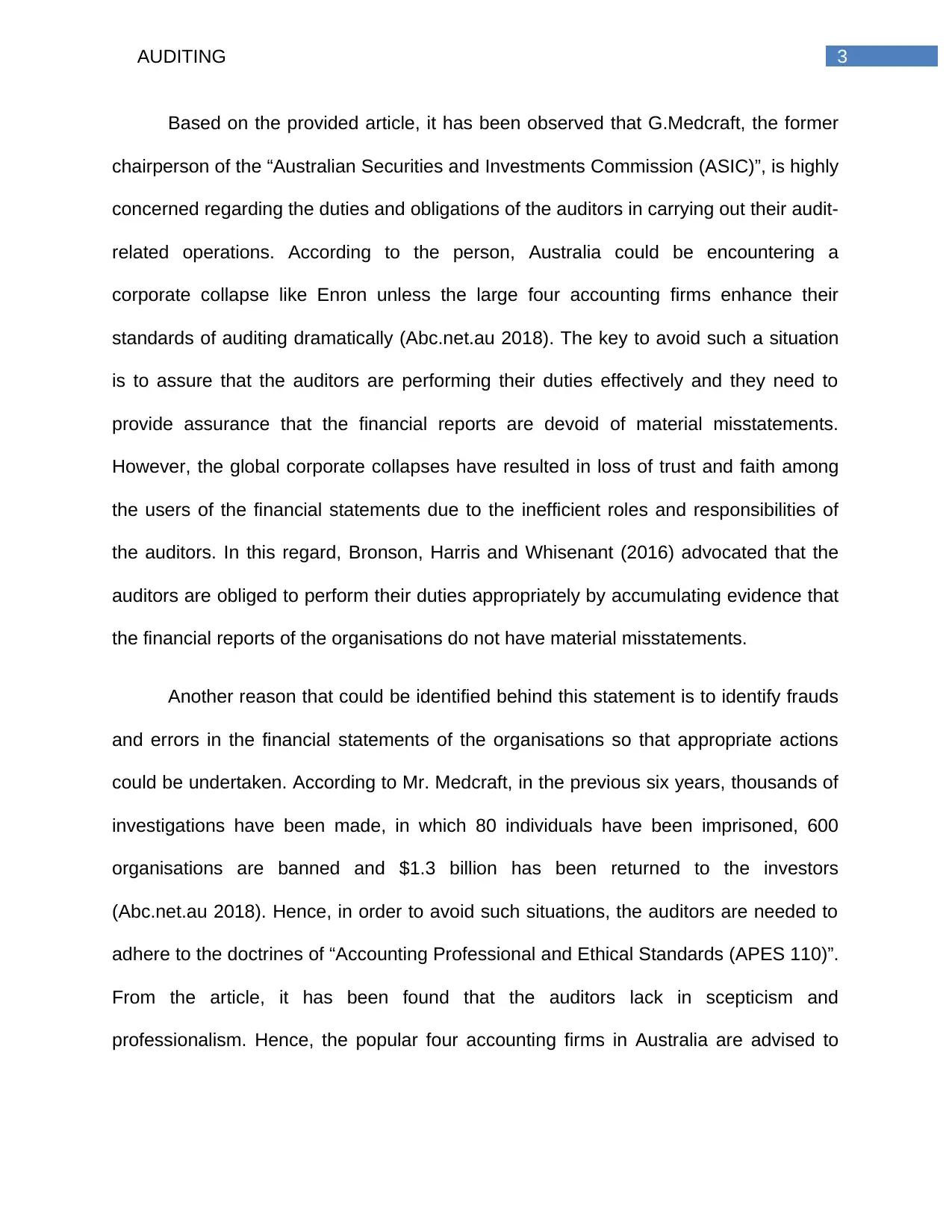
3AUDITING
Based on the provided article, it has been observed that G.Medcraft, the former
chairperson of the “Australian Securities and Investments Commission (ASIC)”, is highly
concerned regarding the duties and obligations of the auditors in carrying out their audit-
related operations. According to the person, Australia could be encountering a
corporate collapse like Enron unless the large four accounting firms enhance their
standards of auditing dramatically (Abc.net.au 2018). The key to avoid such a situation
is to assure that the auditors are performing their duties effectively and they need to
provide assurance that the financial reports are devoid of material misstatements.
However, the global corporate collapses have resulted in loss of trust and faith among
the users of the financial statements due to the inefficient roles and responsibilities of
the auditors. In this regard, Bronson, Harris and Whisenant (2016) advocated that the
auditors are obliged to perform their duties appropriately by accumulating evidence that
the financial reports of the organisations do not have material misstatements.
Another reason that could be identified behind this statement is to identify frauds
and errors in the financial statements of the organisations so that appropriate actions
could be undertaken. According to Mr. Medcraft, in the previous six years, thousands of
investigations have been made, in which 80 individuals have been imprisoned, 600
organisations are banned and $1.3 billion has been returned to the investors
(Abc.net.au 2018). Hence, in order to avoid such situations, the auditors are needed to
adhere to the doctrines of “Accounting Professional and Ethical Standards (APES 110)”.
From the article, it has been found that the auditors lack in scepticism and
professionalism. Hence, the popular four accounting firms in Australia are advised to
Based on the provided article, it has been observed that G.Medcraft, the former
chairperson of the “Australian Securities and Investments Commission (ASIC)”, is highly
concerned regarding the duties and obligations of the auditors in carrying out their audit-
related operations. According to the person, Australia could be encountering a
corporate collapse like Enron unless the large four accounting firms enhance their
standards of auditing dramatically (Abc.net.au 2018). The key to avoid such a situation
is to assure that the auditors are performing their duties effectively and they need to
provide assurance that the financial reports are devoid of material misstatements.
However, the global corporate collapses have resulted in loss of trust and faith among
the users of the financial statements due to the inefficient roles and responsibilities of
the auditors. In this regard, Bronson, Harris and Whisenant (2016) advocated that the
auditors are obliged to perform their duties appropriately by accumulating evidence that
the financial reports of the organisations do not have material misstatements.
Another reason that could be identified behind this statement is to identify frauds
and errors in the financial statements of the organisations so that appropriate actions
could be undertaken. According to Mr. Medcraft, in the previous six years, thousands of
investigations have been made, in which 80 individuals have been imprisoned, 600
organisations are banned and $1.3 billion has been returned to the investors
(Abc.net.au 2018). Hence, in order to avoid such situations, the auditors are needed to
adhere to the doctrines of “Accounting Professional and Ethical Standards (APES 110)”.
From the article, it has been found that the auditors lack in scepticism and
professionalism. Hence, the popular four accounting firms in Australia are advised to
Secure Best Marks with AI Grader
Need help grading? Try our AI Grader for instant feedback on your assignments.
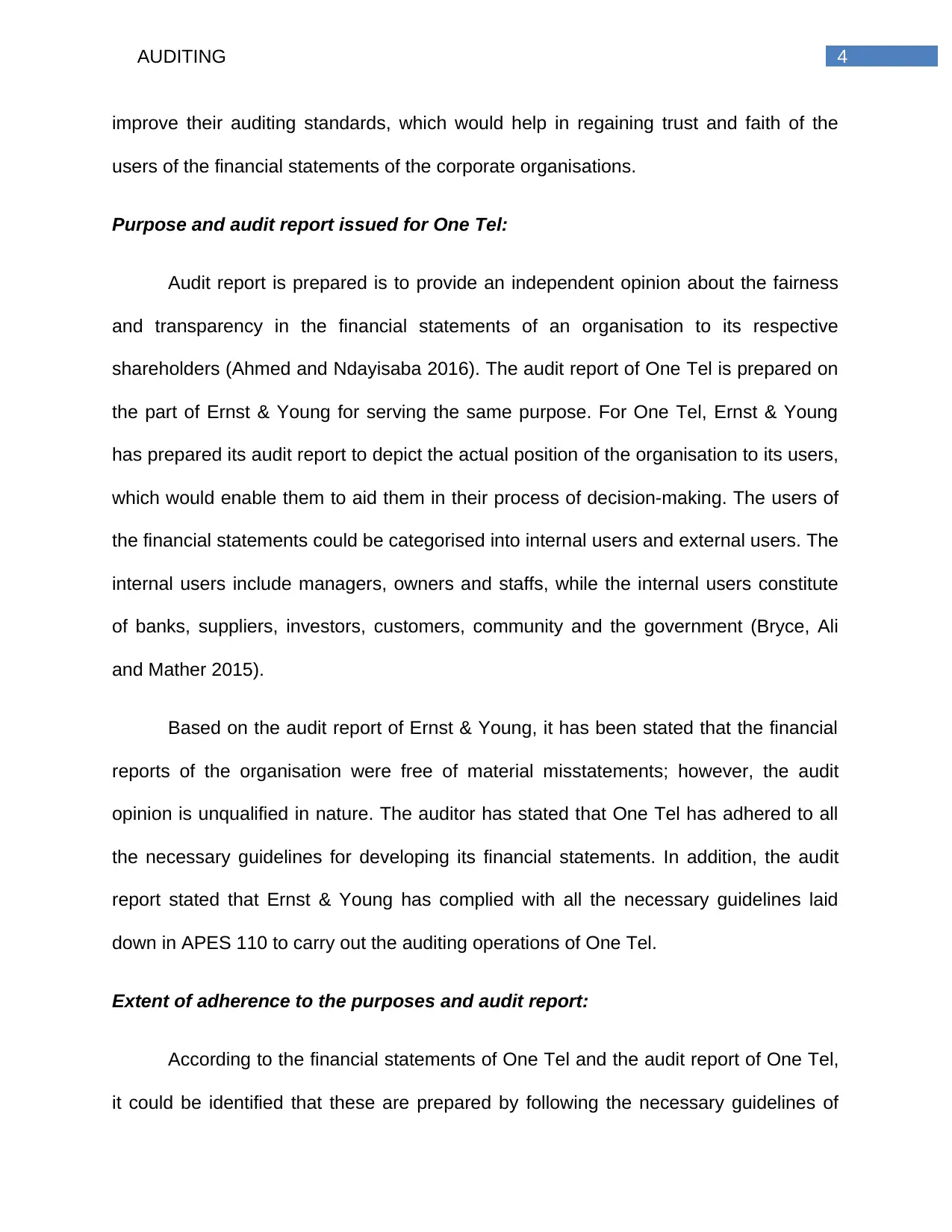
4AUDITING
improve their auditing standards, which would help in regaining trust and faith of the
users of the financial statements of the corporate organisations.
Purpose and audit report issued for One Tel:
Audit report is prepared is to provide an independent opinion about the fairness
and transparency in the financial statements of an organisation to its respective
shareholders (Ahmed and Ndayisaba 2016). The audit report of One Tel is prepared on
the part of Ernst & Young for serving the same purpose. For One Tel, Ernst & Young
has prepared its audit report to depict the actual position of the organisation to its users,
which would enable them to aid them in their process of decision-making. The users of
the financial statements could be categorised into internal users and external users. The
internal users include managers, owners and staffs, while the internal users constitute
of banks, suppliers, investors, customers, community and the government (Bryce, Ali
and Mather 2015).
Based on the audit report of Ernst & Young, it has been stated that the financial
reports of the organisation were free of material misstatements; however, the audit
opinion is unqualified in nature. The auditor has stated that One Tel has adhered to all
the necessary guidelines for developing its financial statements. In addition, the audit
report stated that Ernst & Young has complied with all the necessary guidelines laid
down in APES 110 to carry out the auditing operations of One Tel.
Extent of adherence to the purposes and audit report:
According to the financial statements of One Tel and the audit report of One Tel,
it could be identified that these are prepared by following the necessary guidelines of
improve their auditing standards, which would help in regaining trust and faith of the
users of the financial statements of the corporate organisations.
Purpose and audit report issued for One Tel:
Audit report is prepared is to provide an independent opinion about the fairness
and transparency in the financial statements of an organisation to its respective
shareholders (Ahmed and Ndayisaba 2016). The audit report of One Tel is prepared on
the part of Ernst & Young for serving the same purpose. For One Tel, Ernst & Young
has prepared its audit report to depict the actual position of the organisation to its users,
which would enable them to aid them in their process of decision-making. The users of
the financial statements could be categorised into internal users and external users. The
internal users include managers, owners and staffs, while the internal users constitute
of banks, suppliers, investors, customers, community and the government (Bryce, Ali
and Mather 2015).
Based on the audit report of Ernst & Young, it has been stated that the financial
reports of the organisation were free of material misstatements; however, the audit
opinion is unqualified in nature. The auditor has stated that One Tel has adhered to all
the necessary guidelines for developing its financial statements. In addition, the audit
report stated that Ernst & Young has complied with all the necessary guidelines laid
down in APES 110 to carry out the auditing operations of One Tel.
Extent of adherence to the purposes and audit report:
According to the financial statements of One Tel and the audit report of One Tel,
it could be identified that these are prepared by following the necessary guidelines of
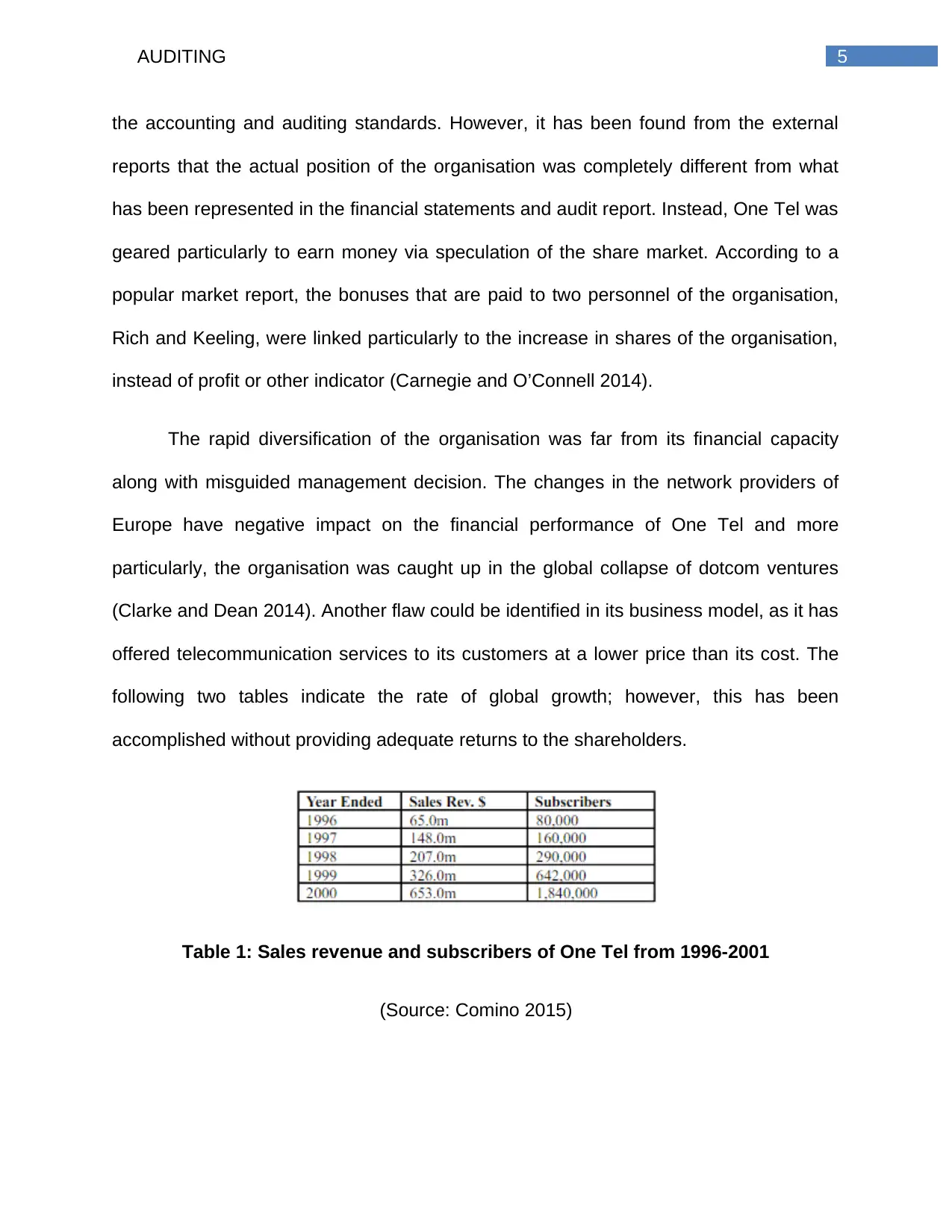
5AUDITING
the accounting and auditing standards. However, it has been found from the external
reports that the actual position of the organisation was completely different from what
has been represented in the financial statements and audit report. Instead, One Tel was
geared particularly to earn money via speculation of the share market. According to a
popular market report, the bonuses that are paid to two personnel of the organisation,
Rich and Keeling, were linked particularly to the increase in shares of the organisation,
instead of profit or other indicator (Carnegie and O’Connell 2014).
The rapid diversification of the organisation was far from its financial capacity
along with misguided management decision. The changes in the network providers of
Europe have negative impact on the financial performance of One Tel and more
particularly, the organisation was caught up in the global collapse of dotcom ventures
(Clarke and Dean 2014). Another flaw could be identified in its business model, as it has
offered telecommunication services to its customers at a lower price than its cost. The
following two tables indicate the rate of global growth; however, this has been
accomplished without providing adequate returns to the shareholders.
Table 1: Sales revenue and subscribers of One Tel from 1996-2001
(Source: Comino 2015)
the accounting and auditing standards. However, it has been found from the external
reports that the actual position of the organisation was completely different from what
has been represented in the financial statements and audit report. Instead, One Tel was
geared particularly to earn money via speculation of the share market. According to a
popular market report, the bonuses that are paid to two personnel of the organisation,
Rich and Keeling, were linked particularly to the increase in shares of the organisation,
instead of profit or other indicator (Carnegie and O’Connell 2014).
The rapid diversification of the organisation was far from its financial capacity
along with misguided management decision. The changes in the network providers of
Europe have negative impact on the financial performance of One Tel and more
particularly, the organisation was caught up in the global collapse of dotcom ventures
(Clarke and Dean 2014). Another flaw could be identified in its business model, as it has
offered telecommunication services to its customers at a lower price than its cost. The
following two tables indicate the rate of global growth; however, this has been
accomplished without providing adequate returns to the shareholders.
Table 1: Sales revenue and subscribers of One Tel from 1996-2001
(Source: Comino 2015)
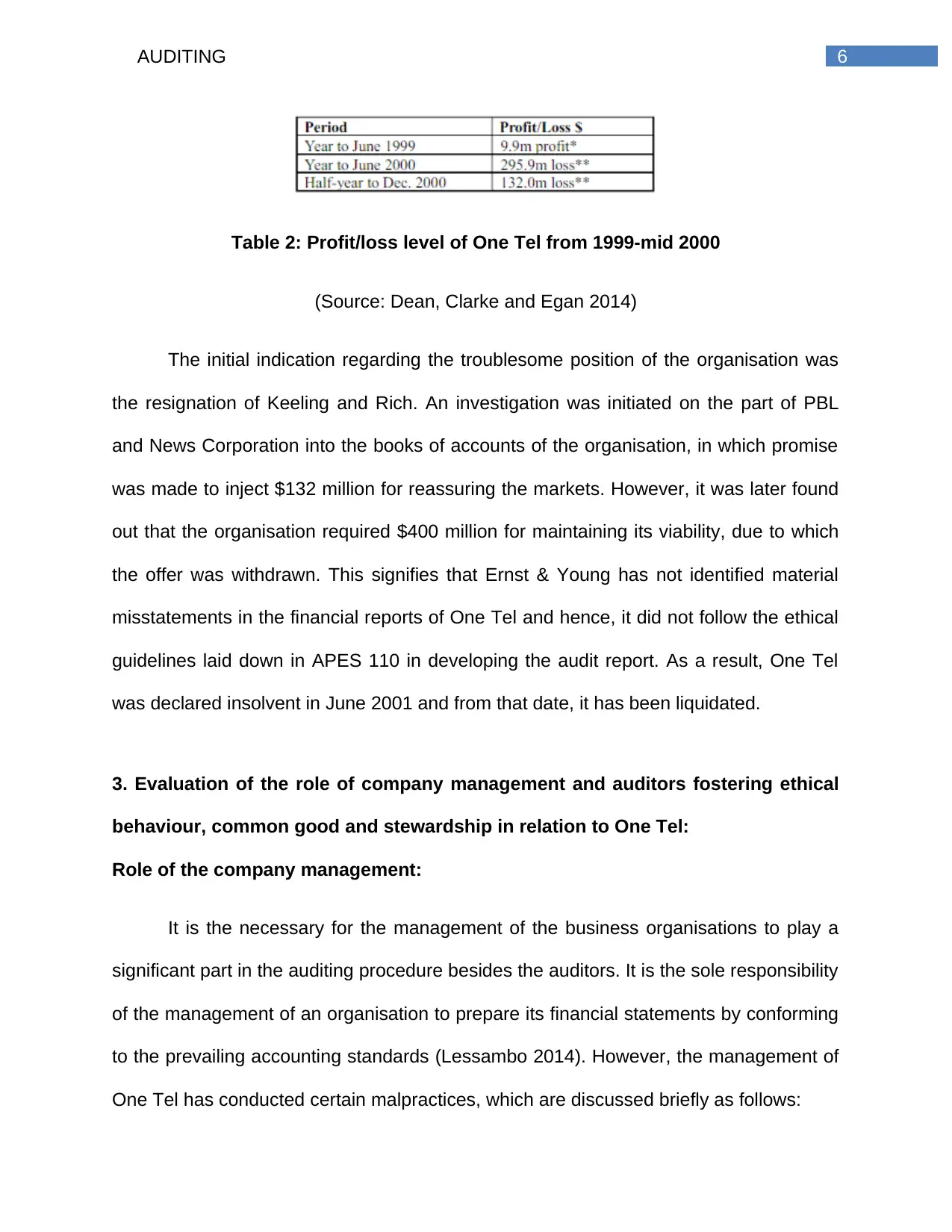
6AUDITING
Table 2: Profit/loss level of One Tel from 1999-mid 2000
(Source: Dean, Clarke and Egan 2014)
The initial indication regarding the troublesome position of the organisation was
the resignation of Keeling and Rich. An investigation was initiated on the part of PBL
and News Corporation into the books of accounts of the organisation, in which promise
was made to inject $132 million for reassuring the markets. However, it was later found
out that the organisation required $400 million for maintaining its viability, due to which
the offer was withdrawn. This signifies that Ernst & Young has not identified material
misstatements in the financial reports of One Tel and hence, it did not follow the ethical
guidelines laid down in APES 110 in developing the audit report. As a result, One Tel
was declared insolvent in June 2001 and from that date, it has been liquidated.
3. Evaluation of the role of company management and auditors fostering ethical
behaviour, common good and stewardship in relation to One Tel:
Role of the company management:
It is the necessary for the management of the business organisations to play a
significant part in the auditing procedure besides the auditors. It is the sole responsibility
of the management of an organisation to prepare its financial statements by conforming
to the prevailing accounting standards (Lessambo 2014). However, the management of
One Tel has conducted certain malpractices, which are discussed briefly as follows:
Table 2: Profit/loss level of One Tel from 1999-mid 2000
(Source: Dean, Clarke and Egan 2014)
The initial indication regarding the troublesome position of the organisation was
the resignation of Keeling and Rich. An investigation was initiated on the part of PBL
and News Corporation into the books of accounts of the organisation, in which promise
was made to inject $132 million for reassuring the markets. However, it was later found
out that the organisation required $400 million for maintaining its viability, due to which
the offer was withdrawn. This signifies that Ernst & Young has not identified material
misstatements in the financial reports of One Tel and hence, it did not follow the ethical
guidelines laid down in APES 110 in developing the audit report. As a result, One Tel
was declared insolvent in June 2001 and from that date, it has been liquidated.
3. Evaluation of the role of company management and auditors fostering ethical
behaviour, common good and stewardship in relation to One Tel:
Role of the company management:
It is the necessary for the management of the business organisations to play a
significant part in the auditing procedure besides the auditors. It is the sole responsibility
of the management of an organisation to prepare its financial statements by conforming
to the prevailing accounting standards (Lessambo 2014). However, the management of
One Tel has conducted certain malpractices, which are discussed briefly as follows:
Paraphrase This Document
Need a fresh take? Get an instant paraphrase of this document with our AI Paraphraser
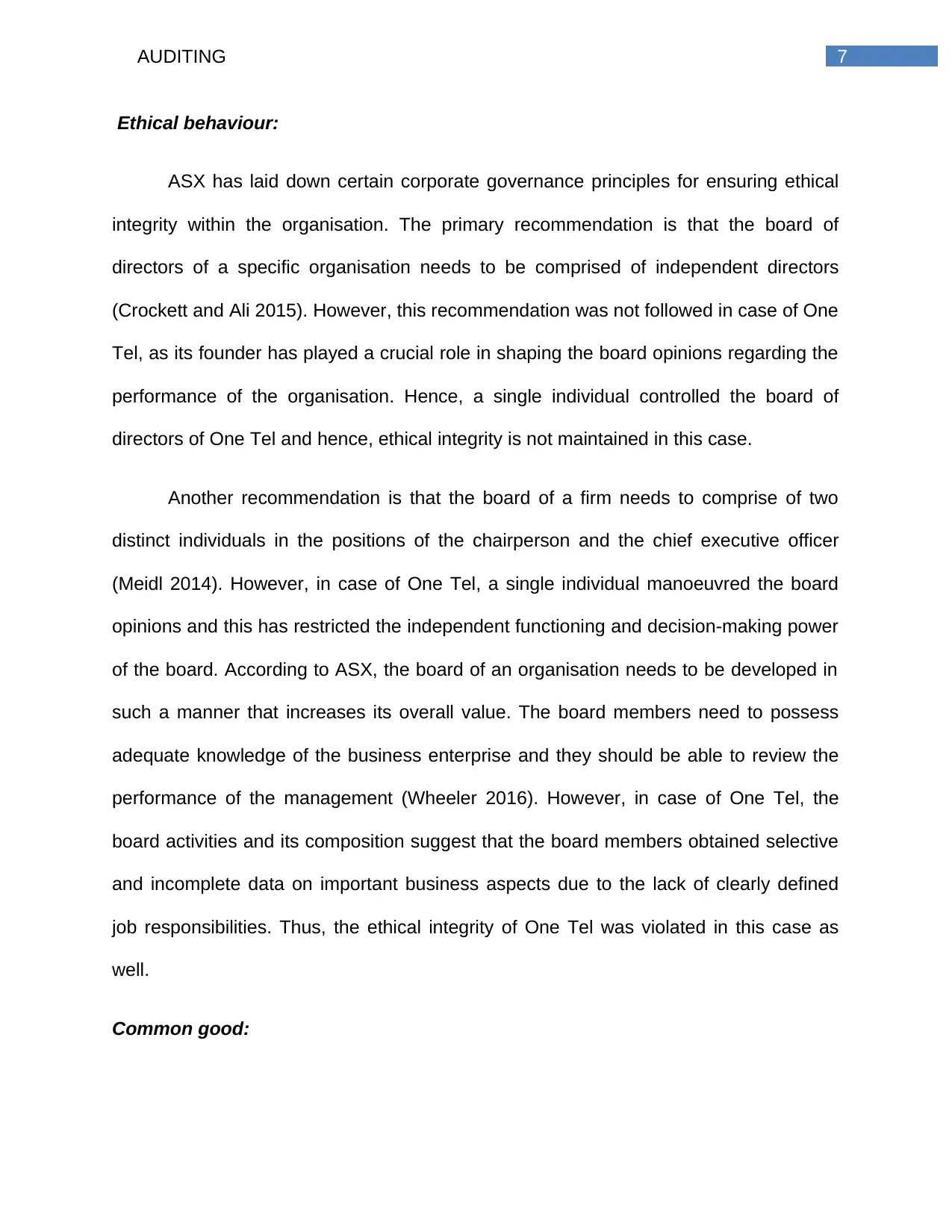
7AUDITING
Ethical behaviour:
ASX has laid down certain corporate governance principles for ensuring ethical
integrity within the organisation. The primary recommendation is that the board of
directors of a specific organisation needs to be comprised of independent directors
(Crockett and Ali 2015). However, this recommendation was not followed in case of One
Tel, as its founder has played a crucial role in shaping the board opinions regarding the
performance of the organisation. Hence, a single individual controlled the board of
directors of One Tel and hence, ethical integrity is not maintained in this case.
Another recommendation is that the board of a firm needs to comprise of two
distinct individuals in the positions of the chairperson and the chief executive officer
(Meidl 2014). However, in case of One Tel, a single individual manoeuvred the board
opinions and this has restricted the independent functioning and decision-making power
of the board. According to ASX, the board of an organisation needs to be developed in
such a manner that increases its overall value. The board members need to possess
adequate knowledge of the business enterprise and they should be able to review the
performance of the management (Wheeler 2016). However, in case of One Tel, the
board activities and its composition suggest that the board members obtained selective
and incomplete data on important business aspects due to the lack of clearly defined
job responsibilities. Thus, the ethical integrity of One Tel was violated in this case as
well.
Common good:
Ethical behaviour:
ASX has laid down certain corporate governance principles for ensuring ethical
integrity within the organisation. The primary recommendation is that the board of
directors of a specific organisation needs to be comprised of independent directors
(Crockett and Ali 2015). However, this recommendation was not followed in case of One
Tel, as its founder has played a crucial role in shaping the board opinions regarding the
performance of the organisation. Hence, a single individual controlled the board of
directors of One Tel and hence, ethical integrity is not maintained in this case.
Another recommendation is that the board of a firm needs to comprise of two
distinct individuals in the positions of the chairperson and the chief executive officer
(Meidl 2014). However, in case of One Tel, a single individual manoeuvred the board
opinions and this has restricted the independent functioning and decision-making power
of the board. According to ASX, the board of an organisation needs to be developed in
such a manner that increases its overall value. The board members need to possess
adequate knowledge of the business enterprise and they should be able to review the
performance of the management (Wheeler 2016). However, in case of One Tel, the
board activities and its composition suggest that the board members obtained selective
and incomplete data on important business aspects due to the lack of clearly defined
job responsibilities. Thus, the ethical integrity of One Tel was violated in this case as
well.
Common good:
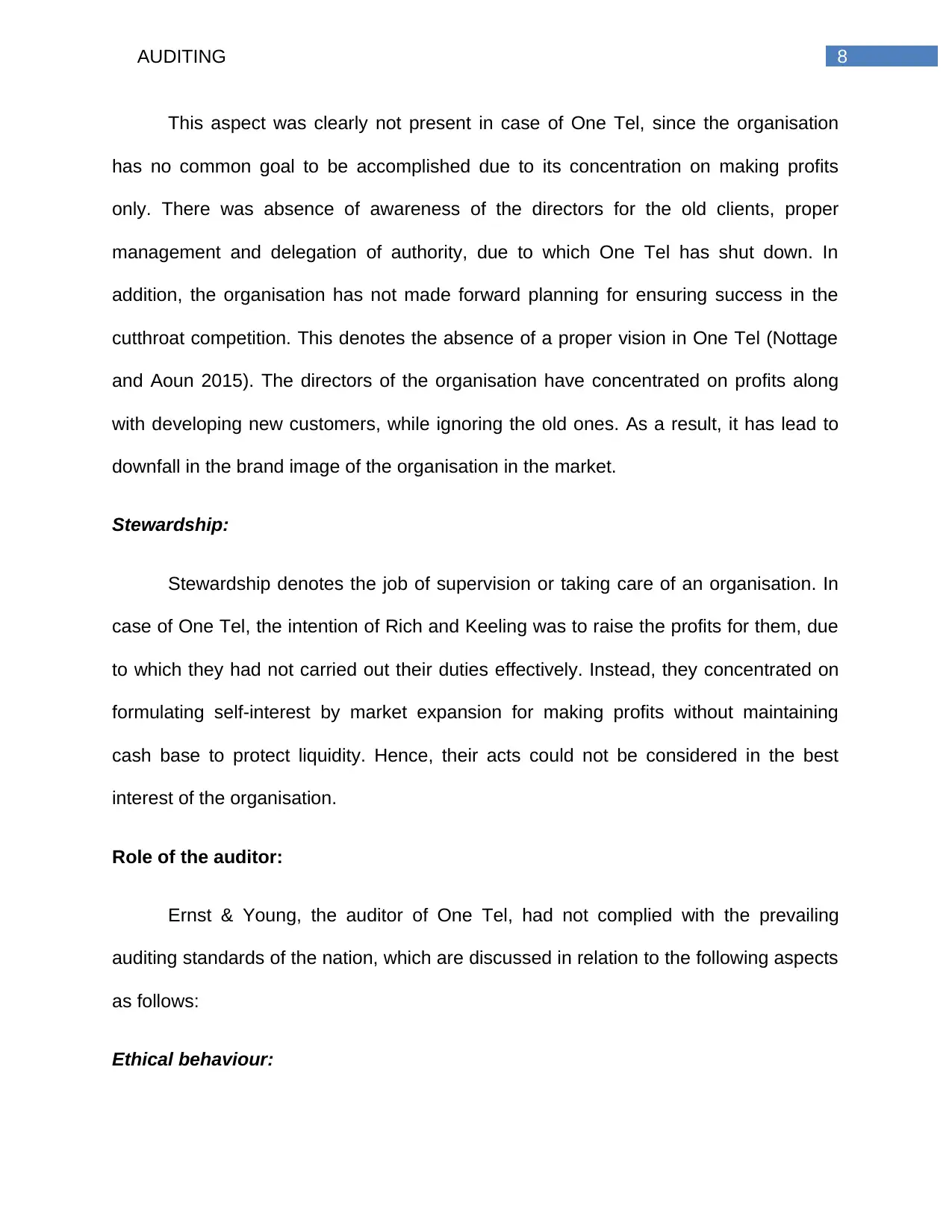
8AUDITING
This aspect was clearly not present in case of One Tel, since the organisation
has no common goal to be accomplished due to its concentration on making profits
only. There was absence of awareness of the directors for the old clients, proper
management and delegation of authority, due to which One Tel has shut down. In
addition, the organisation has not made forward planning for ensuring success in the
cutthroat competition. This denotes the absence of a proper vision in One Tel (Nottage
and Aoun 2015). The directors of the organisation have concentrated on profits along
with developing new customers, while ignoring the old ones. As a result, it has lead to
downfall in the brand image of the organisation in the market.
Stewardship:
Stewardship denotes the job of supervision or taking care of an organisation. In
case of One Tel, the intention of Rich and Keeling was to raise the profits for them, due
to which they had not carried out their duties effectively. Instead, they concentrated on
formulating self-interest by market expansion for making profits without maintaining
cash base to protect liquidity. Hence, their acts could not be considered in the best
interest of the organisation.
Role of the auditor:
Ernst & Young, the auditor of One Tel, had not complied with the prevailing
auditing standards of the nation, which are discussed in relation to the following aspects
as follows:
Ethical behaviour:
This aspect was clearly not present in case of One Tel, since the organisation
has no common goal to be accomplished due to its concentration on making profits
only. There was absence of awareness of the directors for the old clients, proper
management and delegation of authority, due to which One Tel has shut down. In
addition, the organisation has not made forward planning for ensuring success in the
cutthroat competition. This denotes the absence of a proper vision in One Tel (Nottage
and Aoun 2015). The directors of the organisation have concentrated on profits along
with developing new customers, while ignoring the old ones. As a result, it has lead to
downfall in the brand image of the organisation in the market.
Stewardship:
Stewardship denotes the job of supervision or taking care of an organisation. In
case of One Tel, the intention of Rich and Keeling was to raise the profits for them, due
to which they had not carried out their duties effectively. Instead, they concentrated on
formulating self-interest by market expansion for making profits without maintaining
cash base to protect liquidity. Hence, their acts could not be considered in the best
interest of the organisation.
Role of the auditor:
Ernst & Young, the auditor of One Tel, had not complied with the prevailing
auditing standards of the nation, which are discussed in relation to the following aspects
as follows:
Ethical behaviour:
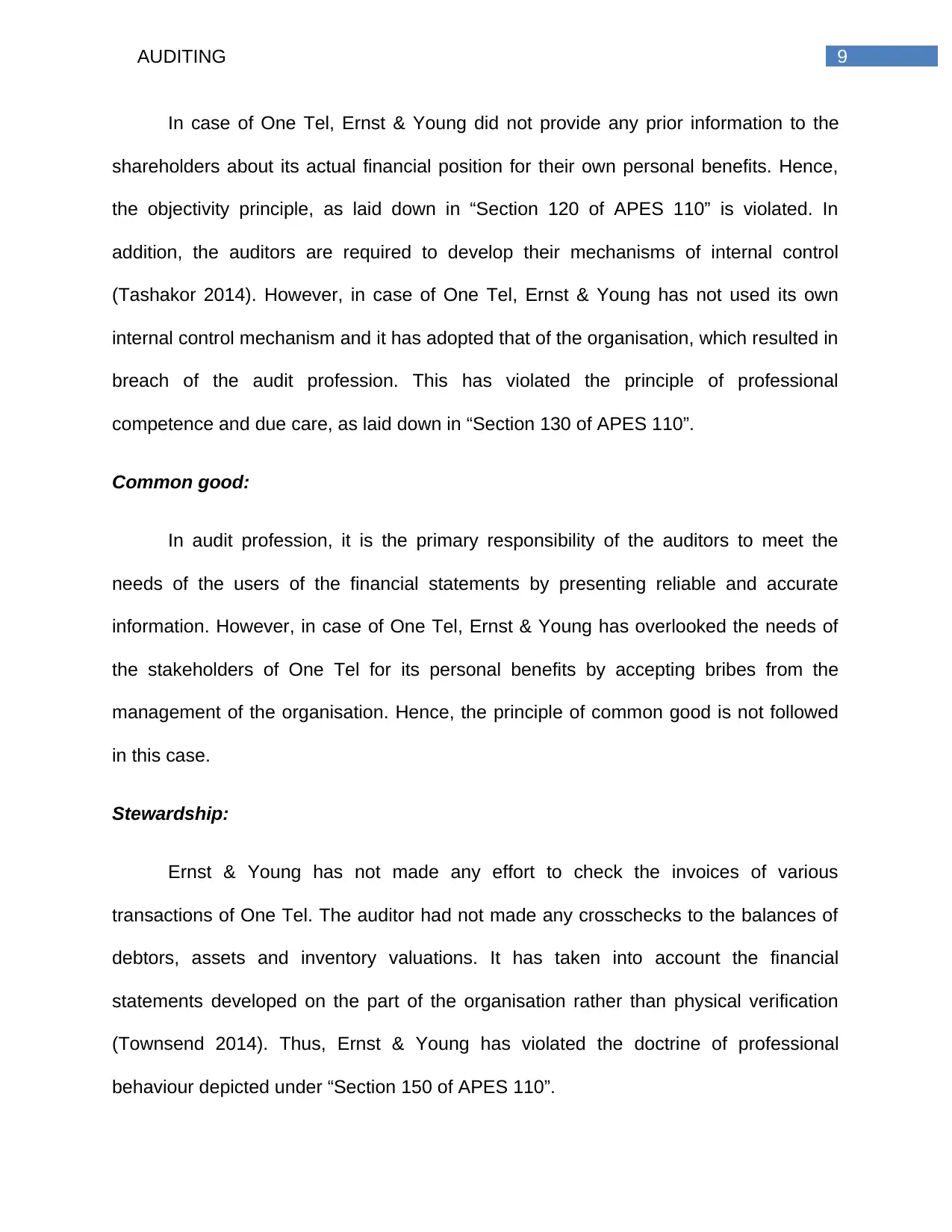
9AUDITING
In case of One Tel, Ernst & Young did not provide any prior information to the
shareholders about its actual financial position for their own personal benefits. Hence,
the objectivity principle, as laid down in “Section 120 of APES 110” is violated. In
addition, the auditors are required to develop their mechanisms of internal control
(Tashakor 2014). However, in case of One Tel, Ernst & Young has not used its own
internal control mechanism and it has adopted that of the organisation, which resulted in
breach of the audit profession. This has violated the principle of professional
competence and due care, as laid down in “Section 130 of APES 110”.
Common good:
In audit profession, it is the primary responsibility of the auditors to meet the
needs of the users of the financial statements by presenting reliable and accurate
information. However, in case of One Tel, Ernst & Young has overlooked the needs of
the stakeholders of One Tel for its personal benefits by accepting bribes from the
management of the organisation. Hence, the principle of common good is not followed
in this case.
Stewardship:
Ernst & Young has not made any effort to check the invoices of various
transactions of One Tel. The auditor had not made any crosschecks to the balances of
debtors, assets and inventory valuations. It has taken into account the financial
statements developed on the part of the organisation rather than physical verification
(Townsend 2014). Thus, Ernst & Young has violated the doctrine of professional
behaviour depicted under “Section 150 of APES 110”.
In case of One Tel, Ernst & Young did not provide any prior information to the
shareholders about its actual financial position for their own personal benefits. Hence,
the objectivity principle, as laid down in “Section 120 of APES 110” is violated. In
addition, the auditors are required to develop their mechanisms of internal control
(Tashakor 2014). However, in case of One Tel, Ernst & Young has not used its own
internal control mechanism and it has adopted that of the organisation, which resulted in
breach of the audit profession. This has violated the principle of professional
competence and due care, as laid down in “Section 130 of APES 110”.
Common good:
In audit profession, it is the primary responsibility of the auditors to meet the
needs of the users of the financial statements by presenting reliable and accurate
information. However, in case of One Tel, Ernst & Young has overlooked the needs of
the stakeholders of One Tel for its personal benefits by accepting bribes from the
management of the organisation. Hence, the principle of common good is not followed
in this case.
Stewardship:
Ernst & Young has not made any effort to check the invoices of various
transactions of One Tel. The auditor had not made any crosschecks to the balances of
debtors, assets and inventory valuations. It has taken into account the financial
statements developed on the part of the organisation rather than physical verification
(Townsend 2014). Thus, Ernst & Young has violated the doctrine of professional
behaviour depicted under “Section 150 of APES 110”.
Secure Best Marks with AI Grader
Need help grading? Try our AI Grader for instant feedback on your assignments.
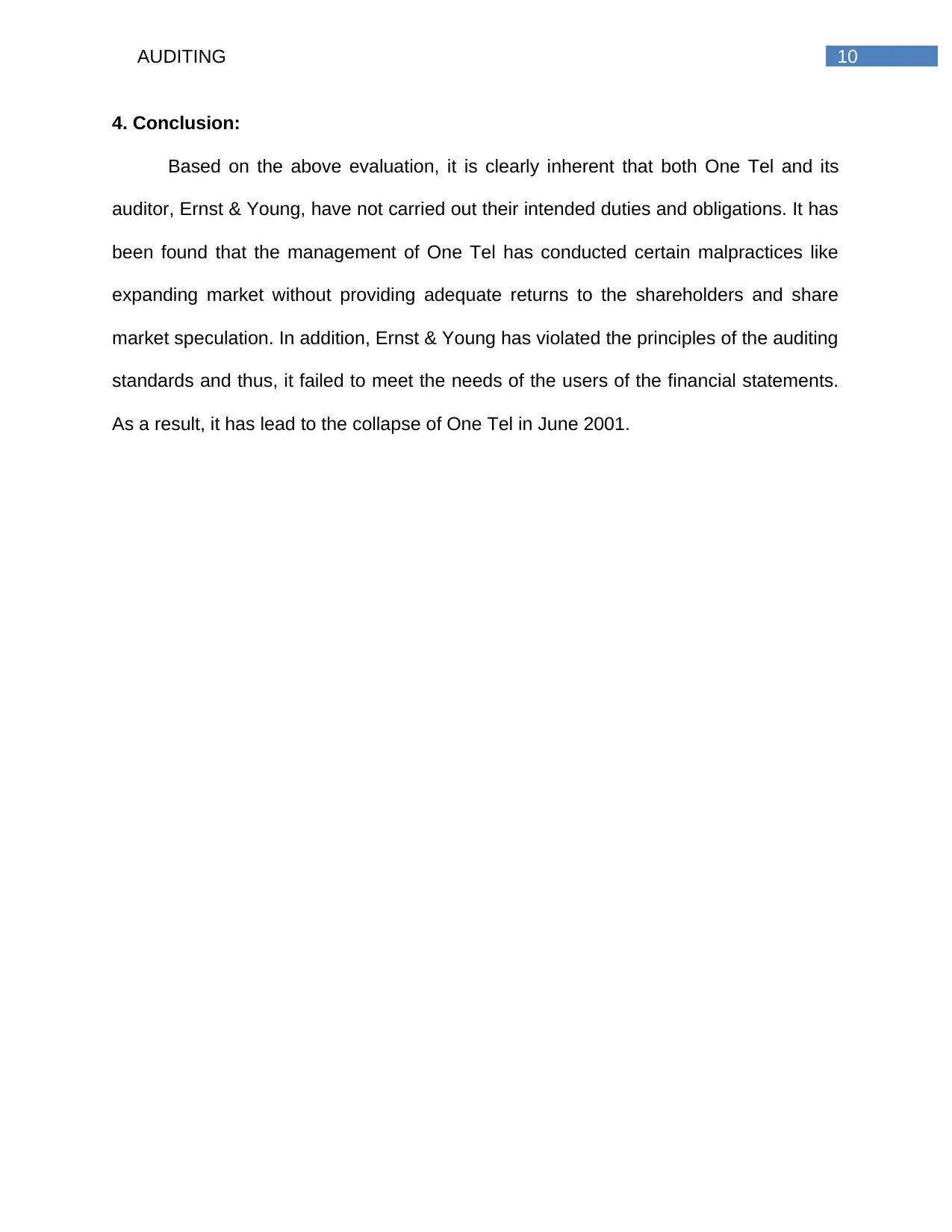
10AUDITING
4. Conclusion:
Based on the above evaluation, it is clearly inherent that both One Tel and its
auditor, Ernst & Young, have not carried out their intended duties and obligations. It has
been found that the management of One Tel has conducted certain malpractices like
expanding market without providing adequate returns to the shareholders and share
market speculation. In addition, Ernst & Young has violated the principles of the auditing
standards and thus, it failed to meet the needs of the users of the financial statements.
As a result, it has lead to the collapse of One Tel in June 2001.
4. Conclusion:
Based on the above evaluation, it is clearly inherent that both One Tel and its
auditor, Ernst & Young, have not carried out their intended duties and obligations. It has
been found that the management of One Tel has conducted certain malpractices like
expanding market without providing adequate returns to the shareholders and share
market speculation. In addition, Ernst & Young has violated the principles of the auditing
standards and thus, it failed to meet the needs of the users of the financial statements.
As a result, it has lead to the collapse of One Tel in June 2001.
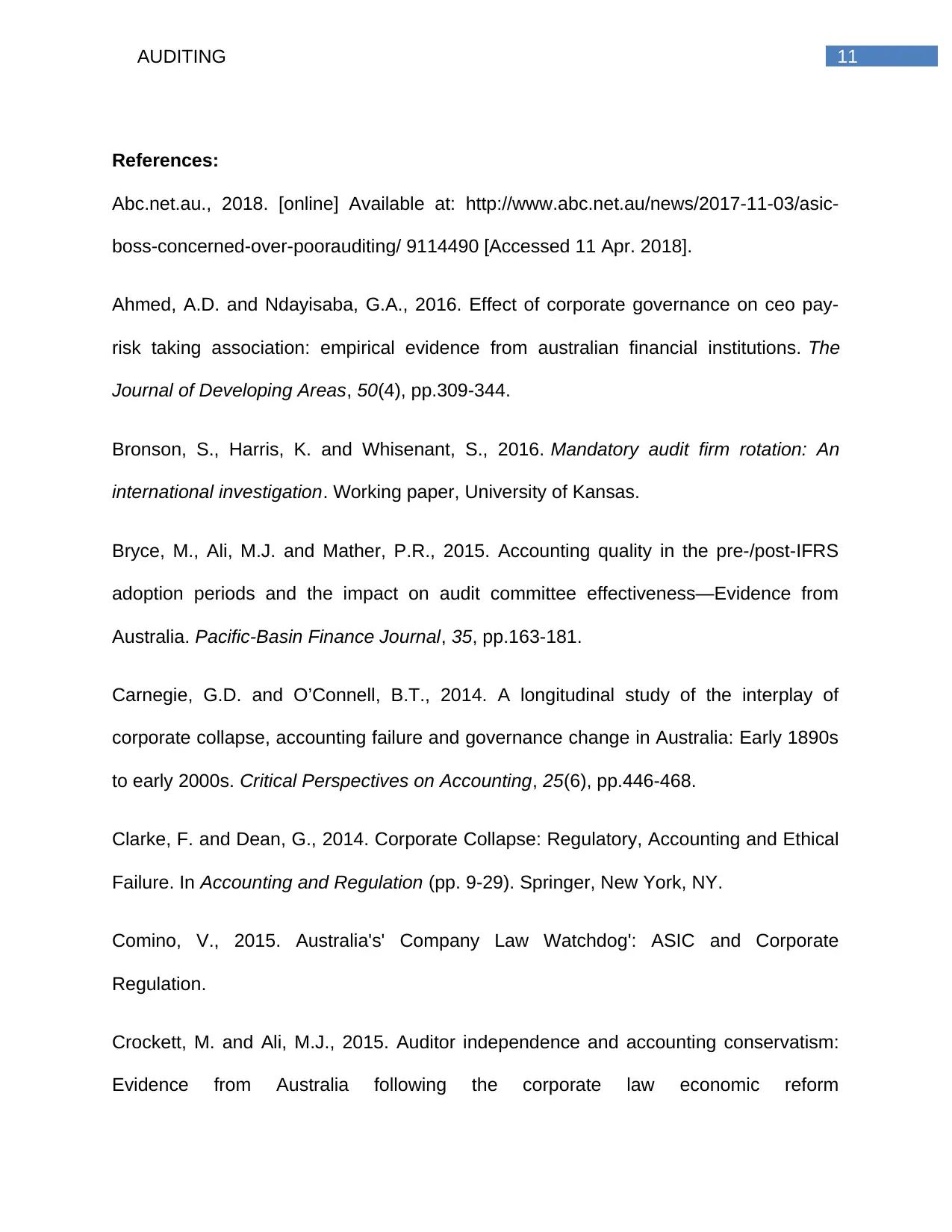
11AUDITING
References:
Abc.net.au., 2018. [online] Available at: http://www.abc.net.au/news/2017-11-03/asic-
boss-concerned-over-poorauditing/ 9114490 [Accessed 11 Apr. 2018].
Ahmed, A.D. and Ndayisaba, G.A., 2016. Effect of corporate governance on ceo pay-
risk taking association: empirical evidence from australian financial institutions. The
Journal of Developing Areas, 50(4), pp.309-344.
Bronson, S., Harris, K. and Whisenant, S., 2016. Mandatory audit firm rotation: An
international investigation. Working paper, University of Kansas.
Bryce, M., Ali, M.J. and Mather, P.R., 2015. Accounting quality in the pre-/post-IFRS
adoption periods and the impact on audit committee effectiveness—Evidence from
Australia. Pacific-Basin Finance Journal, 35, pp.163-181.
Carnegie, G.D. and O’Connell, B.T., 2014. A longitudinal study of the interplay of
corporate collapse, accounting failure and governance change in Australia: Early 1890s
to early 2000s. Critical Perspectives on Accounting, 25(6), pp.446-468.
Clarke, F. and Dean, G., 2014. Corporate Collapse: Regulatory, Accounting and Ethical
Failure. In Accounting and Regulation (pp. 9-29). Springer, New York, NY.
Comino, V., 2015. Australia's' Company Law Watchdog': ASIC and Corporate
Regulation.
Crockett, M. and Ali, M.J., 2015. Auditor independence and accounting conservatism:
Evidence from Australia following the corporate law economic reform
References:
Abc.net.au., 2018. [online] Available at: http://www.abc.net.au/news/2017-11-03/asic-
boss-concerned-over-poorauditing/ 9114490 [Accessed 11 Apr. 2018].
Ahmed, A.D. and Ndayisaba, G.A., 2016. Effect of corporate governance on ceo pay-
risk taking association: empirical evidence from australian financial institutions. The
Journal of Developing Areas, 50(4), pp.309-344.
Bronson, S., Harris, K. and Whisenant, S., 2016. Mandatory audit firm rotation: An
international investigation. Working paper, University of Kansas.
Bryce, M., Ali, M.J. and Mather, P.R., 2015. Accounting quality in the pre-/post-IFRS
adoption periods and the impact on audit committee effectiveness—Evidence from
Australia. Pacific-Basin Finance Journal, 35, pp.163-181.
Carnegie, G.D. and O’Connell, B.T., 2014. A longitudinal study of the interplay of
corporate collapse, accounting failure and governance change in Australia: Early 1890s
to early 2000s. Critical Perspectives on Accounting, 25(6), pp.446-468.
Clarke, F. and Dean, G., 2014. Corporate Collapse: Regulatory, Accounting and Ethical
Failure. In Accounting and Regulation (pp. 9-29). Springer, New York, NY.
Comino, V., 2015. Australia's' Company Law Watchdog': ASIC and Corporate
Regulation.
Crockett, M. and Ali, M.J., 2015. Auditor independence and accounting conservatism:
Evidence from Australia following the corporate law economic reform
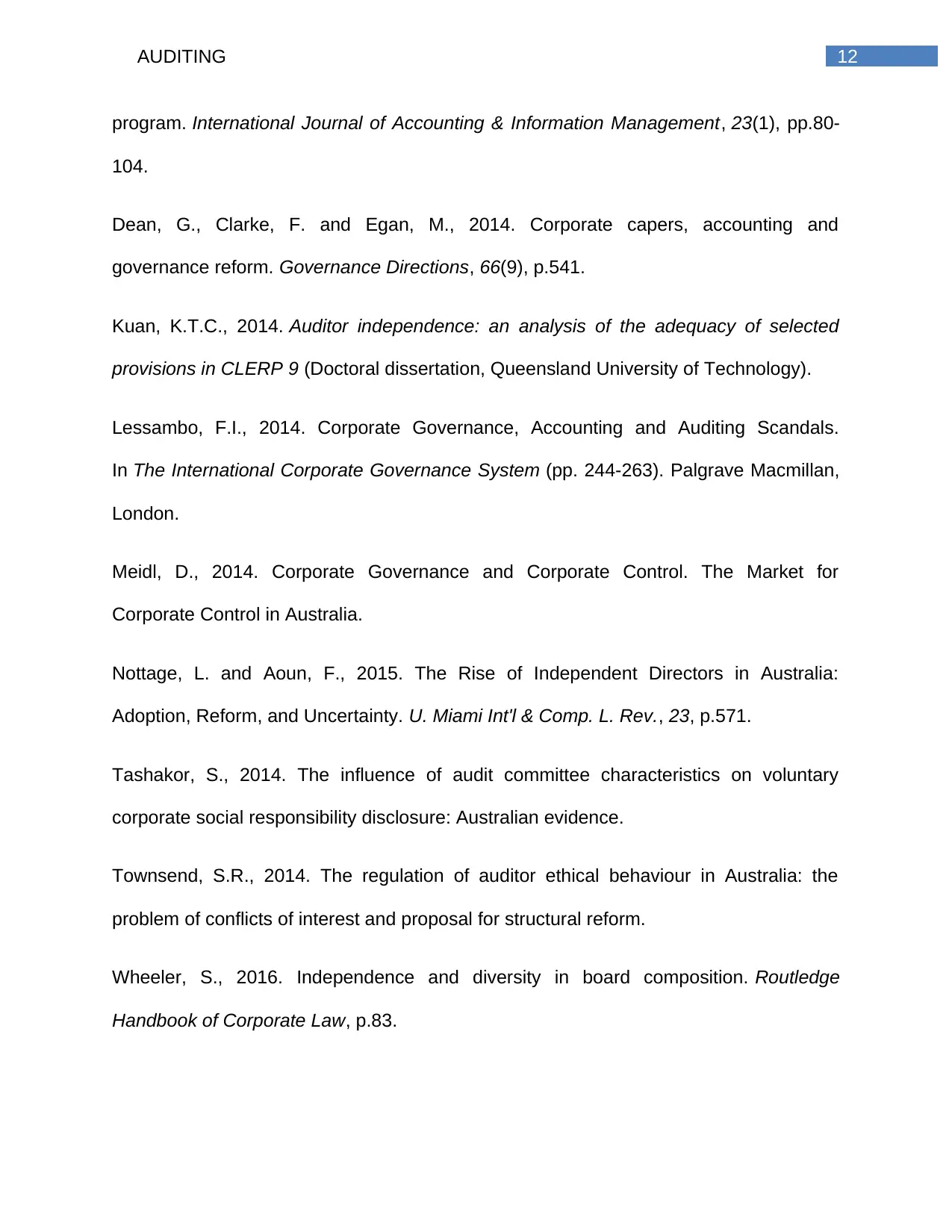
12AUDITING
program. International Journal of Accounting & Information Management, 23(1), pp.80-
104.
Dean, G., Clarke, F. and Egan, M., 2014. Corporate capers, accounting and
governance reform. Governance Directions, 66(9), p.541.
Kuan, K.T.C., 2014. Auditor independence: an analysis of the adequacy of selected
provisions in CLERP 9 (Doctoral dissertation, Queensland University of Technology).
Lessambo, F.I., 2014. Corporate Governance, Accounting and Auditing Scandals.
In The International Corporate Governance System (pp. 244-263). Palgrave Macmillan,
London.
Meidl, D., 2014. Corporate Governance and Corporate Control. The Market for
Corporate Control in Australia.
Nottage, L. and Aoun, F., 2015. The Rise of Independent Directors in Australia:
Adoption, Reform, and Uncertainty. U. Miami Int'l & Comp. L. Rev., 23, p.571.
Tashakor, S., 2014. The influence of audit committee characteristics on voluntary
corporate social responsibility disclosure: Australian evidence.
Townsend, S.R., 2014. The regulation of auditor ethical behaviour in Australia: the
problem of conflicts of interest and proposal for structural reform.
Wheeler, S., 2016. Independence and diversity in board composition. Routledge
Handbook of Corporate Law, p.83.
program. International Journal of Accounting & Information Management, 23(1), pp.80-
104.
Dean, G., Clarke, F. and Egan, M., 2014. Corporate capers, accounting and
governance reform. Governance Directions, 66(9), p.541.
Kuan, K.T.C., 2014. Auditor independence: an analysis of the adequacy of selected
provisions in CLERP 9 (Doctoral dissertation, Queensland University of Technology).
Lessambo, F.I., 2014. Corporate Governance, Accounting and Auditing Scandals.
In The International Corporate Governance System (pp. 244-263). Palgrave Macmillan,
London.
Meidl, D., 2014. Corporate Governance and Corporate Control. The Market for
Corporate Control in Australia.
Nottage, L. and Aoun, F., 2015. The Rise of Independent Directors in Australia:
Adoption, Reform, and Uncertainty. U. Miami Int'l & Comp. L. Rev., 23, p.571.
Tashakor, S., 2014. The influence of audit committee characteristics on voluntary
corporate social responsibility disclosure: Australian evidence.
Townsend, S.R., 2014. The regulation of auditor ethical behaviour in Australia: the
problem of conflicts of interest and proposal for structural reform.
Wheeler, S., 2016. Independence and diversity in board composition. Routledge
Handbook of Corporate Law, p.83.
1 out of 13
Related Documents
Your All-in-One AI-Powered Toolkit for Academic Success.
+13062052269
info@desklib.com
Available 24*7 on WhatsApp / Email
![[object Object]](/_next/static/media/star-bottom.7253800d.svg)
Unlock your academic potential
© 2024 | Zucol Services PVT LTD | All rights reserved.





